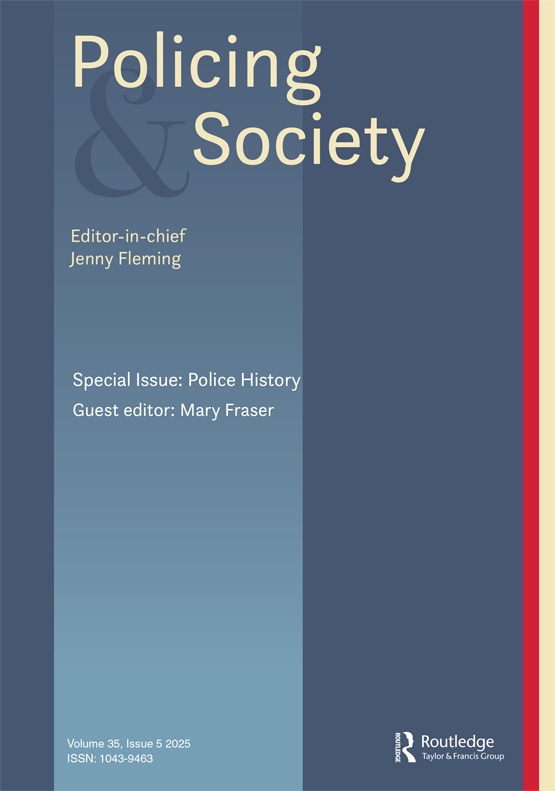Book review on police history in Cultural and Social History http://dx.doi.org/10.1080/14780038.2025.2448373
The Metropolitan Police and the British Film Industry, 1919–1956: Public Relations, Collaboration and Control, by Alexander Charles Rock, London, Bloomsbury/British Film Institute, 2023, 278 pp., £76.50 (hardback), ISBN 9781350295087; £26.09 (paperback), ISBN 9781350295124
This intriguing book details the involvement of the Metropolitan Police in a series of three feature films and two supporting features produced collaboratively with the film industry between 1945 and 1956. It shows the factors and the cumulative and growing influence of the Public Information Officer, Percy Fearnley, a seasoned Fleet Street journalist, in the production of The Blue Lamp (1950); Street Corner (1953), and The Long Arm (1956), with the power relationships involved in the films’ production. We see the Metropolitan Police Press Bureau, headed by Fearnley from 1945, attempting to manipulate the image of the police through the control of these cultural productions. The book starts by showing previous work on the general role of the film producer and how Fearnley developed this role to become the controller of written and visual media for the Metropolitan Police with the filmmakers. His influence ensured the films, made by different film studios and with different film directors, worked as public relations exercises for the Metropolitan Police by providing documentary realism. Although the Met established its Press Bureau in 1919, this book charts Fearnley’s image management from his appointment in November 1945 so that the public saw paternalistic benevolence in all ranks and activity within Scotland Yard, shaping the projects’ propaganda in conjunction with the film studios and to a lesser extent newspapers, to the Met’s advantage, until 1955 when the rise of television heralded a change in cinema.
Early chapters argue that the development of films about the police was designed to meet the cultural needs and desires of the audience, while acting as propaganda for the police. By analysing files held at the National Archives in London, Rock shows that control of production is vital to an understanding of narratives of law and order at the time. He starts by considering the early role of the Met’s Press Bureau from its establishment in 1919 intended as a conduit between the Met and the press to improve transparency. However, it became a mechanism for control of the written and visual media until the appointment of Fearnley in 1945, which brought a more collaborative, open and successful approach for both the media and the Met. Beforehand, relationships had been fractious and mired in suspicion. The Press Bureau’s approach pre-1945 was largely censorial.
The development of a more collaborative approach with the media began with four key events starting in 1938 when the Met acknowledged the potential for cinema propaganda: 1. The Ministry of Information commissioned a short film War and Order: 2. The appointment of Percy Fearnley as the first public information officer; 3. The production in mid-1946 of a prestigious documentary This Modern Age: Scotland Yard; and 4. Making the first film collaboratively with an independent producer in mid-1947.
Further development of a collaborative approach to produce film projects also coincided with the appointment of Harold Scott as Commissioner of the Met in 1945. His appointment heralded increased openness towards written and visual media and signalled the appointment of Percy Fearnley as Public Information Officer, with the remit of putting police-press relationships on a satisfactory footing and to control the depiction of the police in popular culture, hidden under the guise of transparency and accountability. Despite Fearnley’s failed attempts to control press coverage of crime scenes, he was more successful in controlling films from as early as a month following his appointment. The important collaborative agreement with the film industry to shoot films within the surroundings of Scotland Yard allowed film makers to claim to show the real Scotland Yard at a time when the market was saturated with many B feature films of the police, with nothing new to offer.
We see the detail of the process of film production, from the initial outlines and treatments to shooting the script and developing the voiceover commentary. Fearnley developed and established his role as Public Information Officer both within the Met and also with the film industry through the film The Modern Age: Scotland Yard, where he became more confident and in control of this film about black market racketeering, following an initial contact from the filmmaker in December 1945. The year preceding the release of the film in September 1946 involved struggles and controversy by Fearnley to develop his role as gatekeeper of publicity and press relations. Harold Scott gave him almost complete freedom to coordinate this public relations exercise. The film The Girl from Scotland Yard followed speedily, not only by granting permission for access but also to provide cast and uniforms, involving the Superintendent of Women Police, Elizabeth Bather, who drastically rewrote much of the initial scrips. The film was to become a recruiting tool for women police, and The Girl from Scotland Yard was released in September 1948. It led to Fearnley and the Metropolitan Police Press Bureau being recognised as the producer of subsequent films, The Blue Lamp (1950); Street Corner (1953), and The Long Arm (1956).
This book is ideal for students and researchers into the history of film as propaganda.
.JPG)

